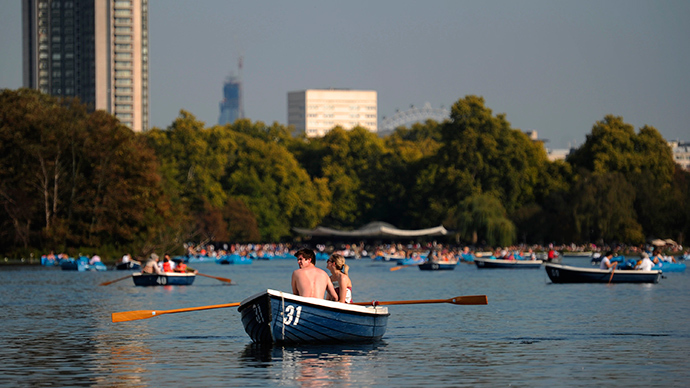Man-made climate change to cause more English heat waves – scientists

Record hot years in England are expected to increase further over coming years because of man-made climate change, scientists say.
In 2014, England experienced its hottest year since records began in 1659. However, even hotter summers may be in store owing to man-made climate change.
The research published in Environmental Research Letters by lead researcher Dr Andrew King of the University of Melbourne, says analysis points to a “substantial and significant increase in the likelihood of record-breaking warm years, such as 2014, due to human influences on climate.”
By studying temperate changes in England, scientists sought to determine whether human-induced climate change altered the likelihood of very warm years.
“We found that human-induced climate change has increased the likelihood of very warm years in central England by at least 13-fold,” Dr King said.
READ MORE: 2014 officially hottest year on record
“Even in such a small region with such wide-ranging weather, we are still able to detect a clear ‘fingerprint’ of human-induced climate change over the relatively short time span of a century.”
Dr Geert Jan van Oldenborgh from the Royal Netherlands Meteorological Institute, who co-authored the study, told the Guardian: “Climate change has become so strong over the last 10 to 15 years that you can really sense it now on the local level.
“Fifteen years ago you could only really see it if you looked at the global mean temperature. And now any old thermometer can show you that the temperatures are increasing.”
Van Oldenborgh added the findings could be used to research how climate influences events like the 2013 UK floods.
READ MORE: 16% of Earth’s species at risk of extinction due to climate change – report
The international team of scientists, using computer modeling and analysis of historical records, showed that man-made (or anthropogenic) climate change is likely to have an impact on increasing temperatures.
Bob Ward, policy and communications director at the Grantham Research Institute on Climate Change at the London School of Economics, said the findings showed how changing temperatures in the UK are affecting people’s lives.
“As the atmosphere warms, it can hold more water, leading to heavier rainfall. Many people, particularly farmers and gardeners, are already observing these impacts, for instance, through spring arriving earlier, and a gradual shifts in the location of some plant and animal species.
“But climate change is also increasing the risk of flooding, both inland from rainfall and along our coasts due to sea level rise, and the risk of heat waves,” he told the Guardian.












